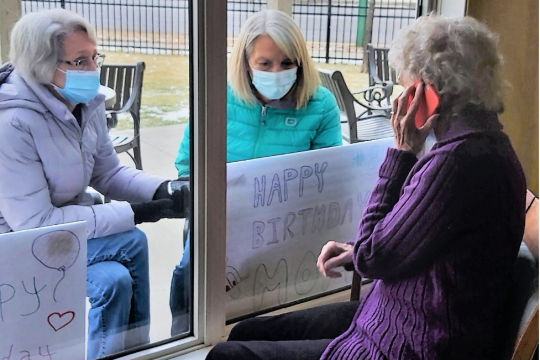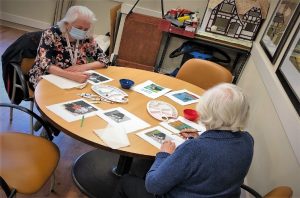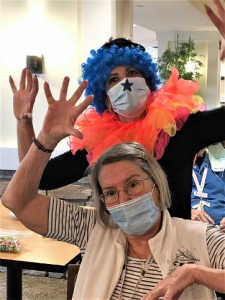
As the pandemic drags on, following COVID-19 prevention guidelines can feel like more and more of a challenge.
This pandemic fatigue is impacting our feelings, thoughts, and behaviors in negative ways. Whether it manifests as anxiety, exhaustion, or defiance, it’s important to recognize and address it for the sake of our physical and emotional health.
For older adults who have been cut off from family and who’s routines have been disrupted over the last 10 months, the emotional burden caused by COVID is becoming heavy.
“The social isolation and accompanying loneliness have a profound impact on the mental wellbeing of seniors”, explains Dr. Suparna Madan, a psychiatrist with Alberta Health Services and Section Head of Geriatric Psychiatry at the University of Calgary. “We’re seeing more depression, anxiety and frustration as the pandemic continues.”
According to Dr. Madan, there is no single coping strategy that seems more helpful in seniors. “Rather, we would recommend taking an individualized approach”, she says. Geriatric Psychiatrist, Dr. Katy Costello and Madan’s colleague also recommends that “Seniors should revisit strategies (including formal programs) that have helped them in the past during times of stress.”
With this risk in mind, All Seniors Care has been diligently working to educate retirement community residents and staff about the various strategies available to help them navigate these new waters.
The trick is to balance physical distancing with social connectedness
“For mental wellbeing, it is important to engage with activities; however, I would remind elderly residents that it is possible to respect precautions while engaging in many activities”, advise Dr. Madan. To feel connected and empowered, seniors can brainstorm with their health care providers on strategies for maintaining their cherished activities while still following guidelines.
One of the complications of this long-haul pandemic is that, as we adjust to the new normal, it’s natural to let our guard down.
To reenforce the use of masks and maintaining a safe physical distance, Dr. Madan reminds people that if they get sick, they may also place loved ones (such as their children and grandchildren)-and the caregivers around them-at risk because this illness has proven it can affects those across age spectrum.
Since each person is metabolizing this pandemic in uniquely personal ways, perhaps the answer is finding hope. If your hope is flagging in the face of fears, doubts and uncertainties, and you’re drive to adhere to regulations has waned, read about how you can find hope here.
What You Can Do to Reduce the Impact of Pandemic Fatigue

On the positive side, resilience is common amongst seniors. Virtually all older adults have known adversity and loss; many have a “this too shall pass” attitude. And research confirms that they tend to be adept at regulating their reactions to stressful life events — a useful skill in this pandemic.
For those who are feeling fatigued by this protracted emergency, it’s essential to revisit our coping skills, including:
- Emotional reframing of quarantines and social distancing restrictions are essential as the colder weather and fewer hours of daylight set in. Rather than think of the rules as things we’re being forced to follow, think of them as actions we’re freely choosing to do to help others.
- Reflecting on what was important to you and provided meaning to your life prior to the pandemic can help people find strength and purpose as quarantines continue. Although it is not an ideal situation, we have been given a chance to re-assess our priorities and be present for one another. During this time, being present and fostering healthy relationships is key.
- Exercise: It’s the No. 1 best thing we can do for coping. Any exercise – even a simple walk – helps. It releases endorphins and gets some of the adrenaline out when the frustration builds up. Just getting out and moving can be helpful for older people.
- Talk about it: Finding someone – family, friend or professional – to talk to about your frustrations and anxieties is extremely helpful. Ignoring feelings or emotions doesn’t make them go away – they’ll eventual come out and you may not have as much control over them.
- Constructive thinking: We may think it is the situation that causes our feelings, but our feelings come from our thoughts about what’s happening around us. Even though we can’t change the situation, we can adjust our thinking. This is very powerful.
- Model and invite mindfulness and gratitude: Try just being in the moment. You’re right here, in this chair, breathing and looking around. Science tells us that gratitude produces a sense of well-being and purpose when we use it to regain lost perspective. Tell people about what you are grateful for.
 Take it day by day or even moment by moment: Realize you will have good days and bad days, or good moments and bad moments. Recognize that feelings only last for 90 seconds. It’s our thoughts about them that give them a longer lifespan. So, think about what you can do to feel better during the low moments.
Take it day by day or even moment by moment: Realize you will have good days and bad days, or good moments and bad moments. Recognize that feelings only last for 90 seconds. It’s our thoughts about them that give them a longer lifespan. So, think about what you can do to feel better during the low moments.- Be compassionate with yourself and others. Don’t expect perfection. Nobody prepared us for getting through COVID-19. We’re all making it up as we go along and we’re all doing our best.
- Find things to look forward to. All Seniors Care has so many fun activities on the horizon. Ask your Activity Director for a sneak peak of what’s coming in the next month and the New Year (Hint: ASC Games are almost here!) Even the smallest things can be fun to look forward to in the middle of uncertainty.
The most important thing is not to give up. As Dr. Madan points out, “There is also a lot of optimism around vaccine options being available in the near future and hopefully that news provides a light at the end of this long pandemic tunnel.”
Author: Julianna McLeod